Greetings! This Dev Diary will be a mixed bag of various things - there’s a lot going on, and therefore a lot to talk about. I want to take this opportunity to address feedback, talk design philosophy, shine some light on how we’re working, set some expectations for Roads to Power, tease some things coming in the future, and show off the 1.12.5 changelog for a free update happening on May 8th. In other words, this will be a big and a little bit all-over-the-place diary, but bear with me.
►
Discuss Dev Diary #147 on our forums![pdxint.at]
To start off, let's talk about
Community Feedback!
There’s a lot of feedback coming in for the features of Legends of the Dead, and we’re doing our best to collect it. We try to find as much feedback as we can from as many different sources (forums, Reddit, videos, reviews, etc, etc.) as we can - even if you feel like we’re not there, I promise that we read everything - or we try to - and have it in the back of our minds. That said, let's start off with Plagues.
Plagues Plagues is the feature that has been the easiest to collect and action feedback for - even if various types of feedback are sometimes conflated and need to be untangled for us to know what we should change. Your sentiment is somewhat split between plagues either being too easy or too hard, but uniformly they are perceived as annoying by the sheer amount of events they can summon (especially in larger realms).
For Plagues, we’re looking into having balance changes go out together with an update on the 8th of May. The full changelog can be found at the end of this post.
The vast majority of the ‘event spam’ was due to one seemingly-innocent bug in the Alms event; it didn’t have a cooldown set. This means that regardless of our intentions, it’d always be valid to fire, which is of course not as intended. In fact, a lot of the events were set up to simulate negative consequences of unchecked plagues - but as many of you have rightfully pointed out, the general negative modifiers to development and other things are more than enough to represent this. That said, increasing the cooldowns significantly for most of the events that either have easy-to-happen triggers or major negative effects should go a long way in making this feel better.
The second part of making sure the events you get are relevant for you was to make it so they only happen if they’re near an area you care about: if you’re the emperor of a world-spanning empire, you don’t care about the goings-on of a distant backwater, or even if you’re just the King of France you don’t necessarily care what’s going on in the very southernmost parts of Aquitaine - after all, the risk of the plague reaching your lands from there isn’t that great. It seemed that the most common feedback here was to limit the events by distance, so that’s exactly what we did - they can now only happen if the plague is in your domain or within a certain distance from your capital (roughly one Ireland, it’s less than you might think).
Alongside this, we’ve reduced the overall frequency of plague events and shifted the ratio between minor/major/apocalyptic plagues away from minor and towards major/apocalyptic in an effort to make the content you receive more impactful - this should mean that you get fewer plagues overall, but the ones that happen are more significant. We’ve also removed the block on achievements when you lower the frequency, and added an additional option where you can choose to disable plagues (minus the black death) entirely should you wish.
Another recurring point of feedback is difficulty, or rather the lack of challenge - it is felt like the AI is much worse at handling plagues than the player, and this I agree with. While the AI will never be as responsive as the player when it comes to isolating or secluding, they should all treat it as a threat to be countered - choosing to defend themselves shouldn’t be dependent on minor quirks of personality; only truly major ones.
Currently, larger Counties (with more Baronies) are better at defending against plagues - and that was never our intention, as this is literally the opposite of what happened historically - therefore we’ve shifted the plague resistance granted by buildings from County-wide to Barony-wide. This should encourage an alternative playstyle of having fewer-barony Counties in your domain in order to protect development. This is also much more of a challenge for players than it will be for the AI, evening the playing field a bit.
The full changelog for the 1.12.5 update can be found at the very end of this Dev Diary.
Legends Legends are a completely different beast altogether, and are much harder to collect feedback for - opinions on what to do or change differ wildly at this point in time. Of course we’re aware of the general sentiment surrounding the feature, which is why we’re still looking at as much feedback as we can. The
update [forum.paradoxplaza.com]we deployed close to the release targeted some of the widely agreed-upon points of feedback, such as adding a Legend Library where you can see completed legends forever, and more reactive variations in chapter texts to things your character does (such as winning battles, having children, etc.), among other things. For this update, we’ve mainly improved the Legends mapmode as we found it uninspiring and not pleasant to look at due to its limited color palette (and similar colors tended to blend together).
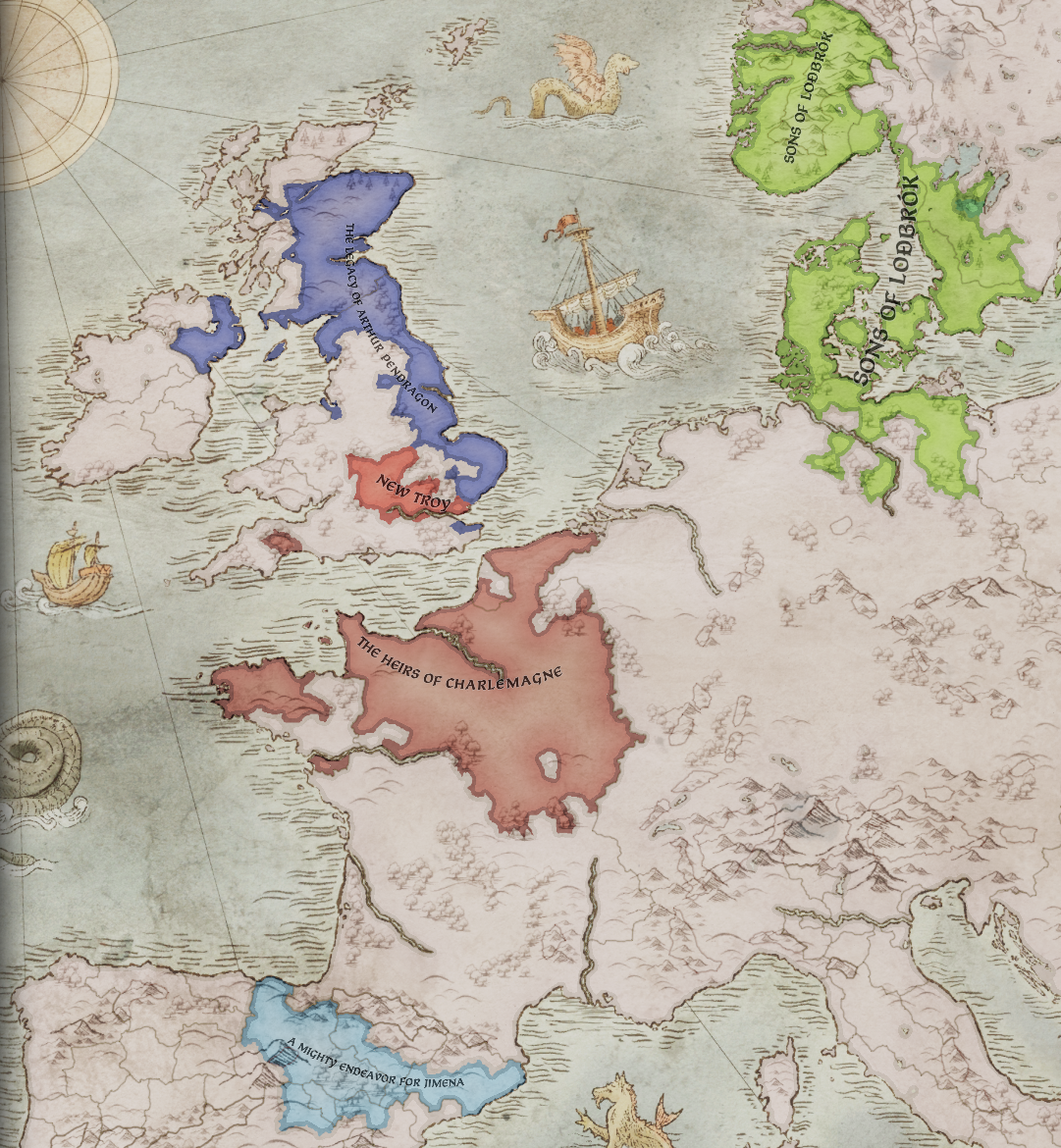
[Image - New legend colors]
The feedback we’re collecting now is hard to act upon. As I mentioned, opinions vary greatly - from thinking that they are underpowered and useless, too overpowered and way too good, or that they should be something else altogether. Some of you are bringing up the example of CK2 Bloodlines (which is interesting to me, seeing as I designed them back in the day.) The Bloodlines of CK2 were designed to be more of a ‘fantasy’ feature, where great, lasting reputations were built by people *actually doing* the great and/or implausible deeds the reputations spoke of - this would then be literally transferred in their blood to either a patrilineal or matrilineal lineage (with some convoluted breeding necessary to ‘stack’ multiple lines on the same character). On the contrary, Legends in CK3 were designed to mimic what medieval rulers actually did; embellish otherwise mundane stories into epics of great renown - all in order to bolster their legitimacy in the eyes of their subjects or the renown of their dynasty. Which of the two approaches is the best can be debated, and I think there’s merit to both. We wanted to go for the more true-to-history one for CK3 - if nothing else - because it’s something we hadn’t done before.
Truth be told though, I think the problem with Legends lies less in the feature itself and more in how we communicated them in Dev Diaries and similar - we weren’t clear enough what they were going to be. This is something we can act upon. Going forward, any Dev Diary we’re making on a feature will aim to be less open for interpretation. As with diaries of old, we’ll try to describe features in as much detail as possible. We don’t want any misconceptions about what the features are or how they work. You can expect the diaries for Roads to Power to be detail-filled behemoths when they start.
Bettering the Game Next up, I’d like to share some details on how we work to make the game better over time. No matter if we’re working on an expansion, free update, or other type of release, we always try to improve the game by doing various initiatives and looking at feedback.
How We Work There are different ways we’re doing this, such as through the dedicated Balance Days we have every three weeks - for which we keep a big sheet of ‘game balance areas’ that we review and add to.
Currently, these days are focused on improving some of the older content we’ve released, as well as doing balance passes on resources such as Prestige and game components such as Cultural Traditions. The main philosophy we’re following when reviewing old content is to balance it for fun. If a piece of content isn’t already engaging, flavorful, interesting, or fulfilling a specific purpose, then it needs to at least be made entertaining or useful. Right now, we’re working on updating Court Events from Royal Court - a set of events that are regarded to be fairly poor and inconsequential by many of you, and we do agree with that assessment in hindsight. We’re ripping out and replacing much of the content within that pool, hopefully for the better. As for Prestige, we’ve also taken a look at what causes the AI to go into Prestige debt and thus be unable to declare war - all in order to make it more challenging and not feel as inert. Many Cultural Traditions presented very small or narrow trade-offs that players would rarely choose, so we decided to change our philosophy to work with larger buffs and more significant/interesting tradeoffs. Updating older content or doing large balance passes is always on our radar, and will often arrive together with larger updates - all of what I mentioned here, Court Events, AI Prestige debt, and Cultural Tradition balance, will arrive alongside Roads to Power.
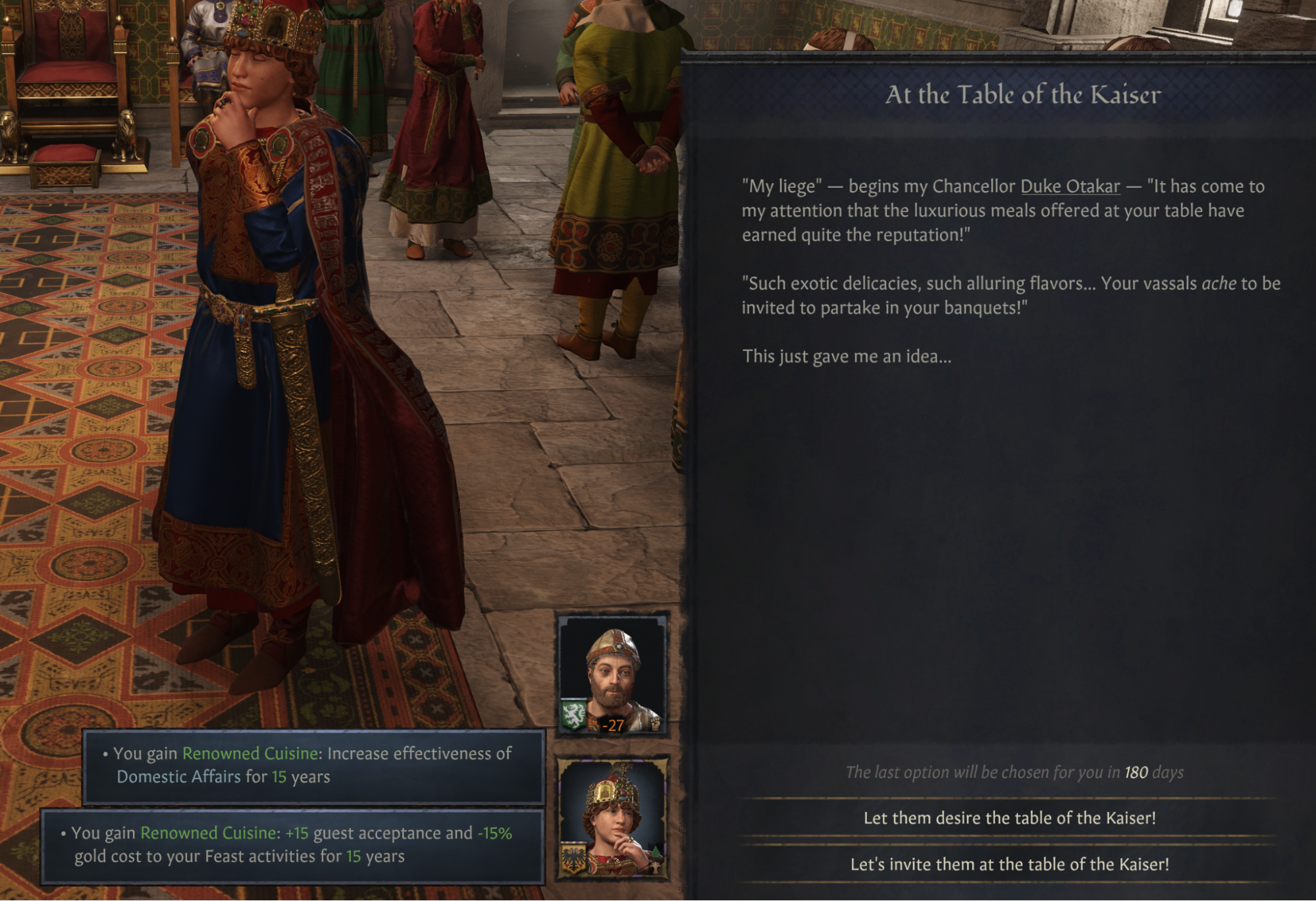
[Image - One of the revised court events]
We also work with Community Reports - our community team scours the various platforms where you have discussions, looking for trends and issues, and then they compile reports. These reports are very useful and show us if an issue or topic keeps being brought up. A lot of the changes we’re making to the plagues were measured using these reports.
In addition to this, we also have Fix Weeks (every three weeks, we focus exclusively on fixing bugs), Improvement Days (where we look at a backlog of improvements we’ve gathered, including your wishes!), and more. Much of our time is spent on making the game better, and we’re constantly evaluating how we’re working to see how we can best improve the game as much as we can.
Event Frequency A common topic that I see discussed in many places is the frequency of events, that they can feel ‘spammy’ - not necessarily because there’s always too many of them at once (although that certainly happens every now and then), but because you often see the same events often. The more insignificant or punishing a (random) event is, the less often you want to see it happen. Having a flavorful situation appear now-and-then is fine, but being blocked by a challenger on the road or hearing a duck quack several times per character feels off.
Now, the method we have when creating ‘pools’ of content is to have a generous amount of events that have easy-to-happen triggers and can happen in many situations. This we do in order to make sure you’re always valid to see something. While making an event that triggers for a niche situation feels really good, the likelihood of it being seen at all drastically decreases the more complex the situation is, making it less and less valuable to spend time making - to the point where it might be half a percent or less of the playerbase who sees them. This means that we aim for way more ‘general’ events as a rule of thumb, a ratio between general and niche (which varies depending on the pool we’re filling). Of course, a consequence of this is that you’re going to see the events with easy-to-happen triggers way more often - sometimes with every character you play, and sometimes multiple times per character (depending on the event cooldown).
Reading your feedback I’m inclined to make some changes to our philosophy, and I’d appreciate further feedback on this before we make any decisions.
What we are looking at is a combination of more significant cooldowns and a new system to restrict certain events for some characters you play could have the following effects:
- Pro: You would see the same events way less often
- Pro: You would have more varied ‘general’ event content between characters
- Pro: ‘Rare’ events would become somewhat more visible, due to fewer ‘general’ events being valid
- Con: Some event pools might give you less event content over time (which might be a Pro for some of you)
I’d like to go into a bit more detail on how this would work. Generally, we use 5 or 10 years as the most common cooldown for events; they are the default go-to values. For events with easy-to-happen triggers, what we could do is simply increase this cooldown - this would make it so that there’s a significantly lower chance of seeing the same event multiple times with the same character. This wouldn’t hinder each of your successive rulers from seeing the events at least once though, which would limit its impact as a stand-alone measure. If we introduced a system where we could randomly make events valid or invalid for your character, say that an event would be valid for 50% of characters, then we’d be able to ensure that not all characters see the same events. For some we could have lower values, for others higher - it could be a judgment call based on what the event is, and its purpose.
Of course, these two measures would only be interesting to enable for certain types of events, and wouldn’t work to introduce for all events (for example, you need all lifestyle events to be valid so that you have ways of gaining XP). That said, I believe that this could help drastically reduce the issue of excessively frequent events. Let me know what you think.
Message Settings Another type of spam that is often (rightfully) brought up is that of messages, notifications (the bottom-right ones) and toasts (the top center ones that fade after a few seconds) have been accumulating for some time, and sometimes reach critical mass when playing - especially if you’re further into a session. The solution to this has been clear for a while, and we’ve finally found the time to realize it. With the update releasing together with Roads to Power you will have access to Message Settings. This means that you can disable or change any feed or toast message stemming from a ‘systemic’ source (in other words, anything that isn’t the result of an event outcome such as a skill duel, etc.) This should allow you to tailor what you see and are notified with based on personal preference.
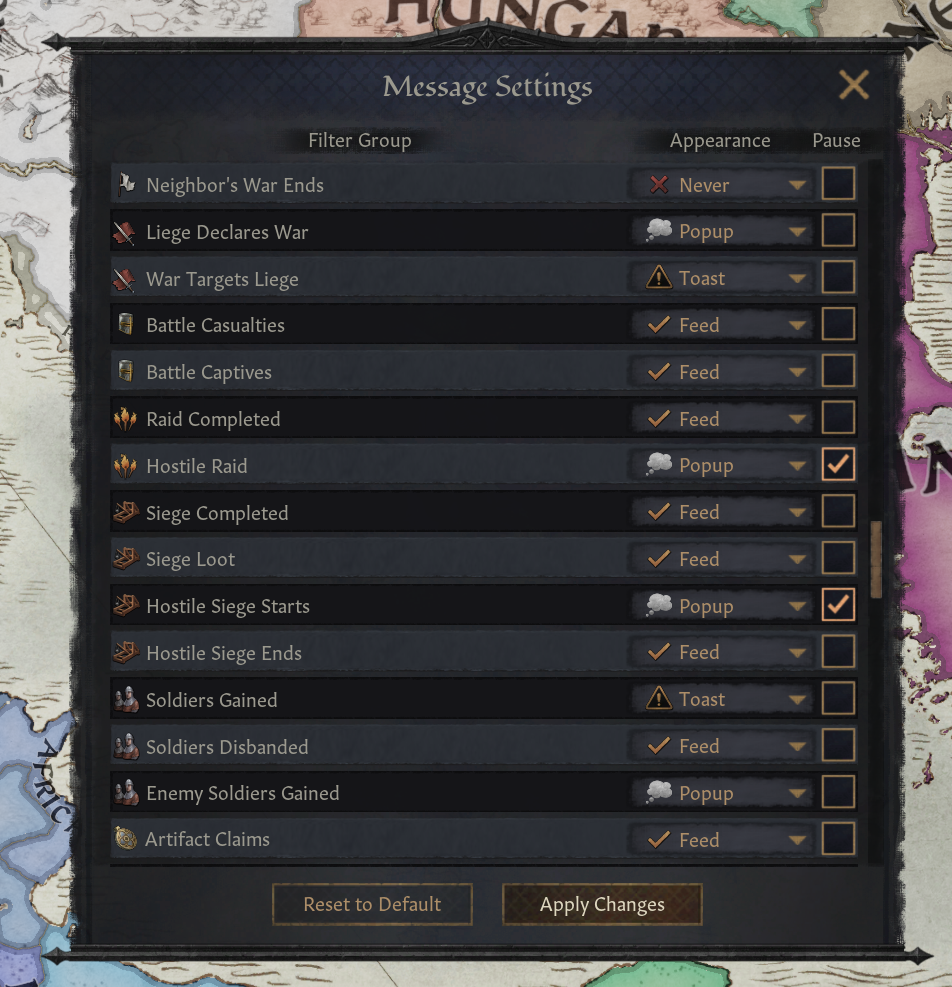
[Image - CK3 message settings, modified by me to fit my playstyle]
As a bonus, this also allows you to automatically pause the game if something specific happens, and you can even set messages to be delivered in the form of a pop-up should you really want to not miss something! For example - I know that a lot of you who used to play CK2 set hostile sieges to pause the game so you wouldn’t miss them, now you can do the same in CK3.
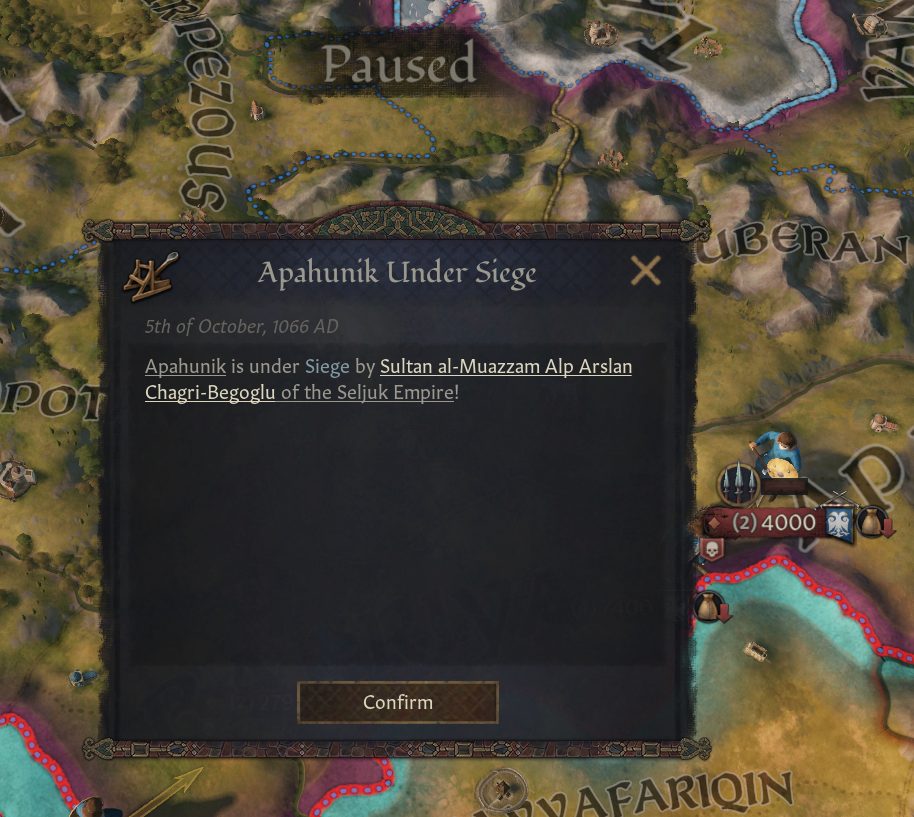
[Image - Popup and pause on enemy sieges]
The Philosophy of Free When developing expansions you have to make many calls of what should be paid and what should be free. Back in the day (I’ve worked at Paradox for 10 years now, time truly flies), we were not very good at determining what could be paid and what should be free. This had several unfortunate side effects; players who didn’t have certain expansions would be alienated, us developers would have to spend extra time supporting multiple parallel systems within the same game (including all manner of permutations between different expansion combinations…), and it sometimes made it harder to further develop popular systems. As a company we develop games that can live for a very, very long time - this implies a lot of work keeping the game healthy by updating features, fixing issues, doing balance work, and other things that aren’t just about making new expansions.
Over the years, we’ve started to make more and more base systems free at their core, which is something that came from listening to you in the community. The reason why we’re doing this is because we want your experience to be better - for the game to be healthy, for systems to be more accessible to modders, and so that we can update areas of the game that we feel would simply make the experience better. This alleviates the unfortunate side effects I mentioned above.
Speaking of modders; we love them, and we love the fact that so many people want to mod our game. This is why we spend extra time making new systems as flexible as possible, and why we take some of our time to do things that are pure support for mods (one of the latest examples
here[forum.paradoxplaza.com].) We appreciate the work they do and their creativity, but we don't want to rely on them to make the game for us - we only rely on them to share their passions about the game! It's important that the game is feature complete and enjoyable without mods.
Now, we don’t aim for a fixed ratio between free or paid - we aim to make the game better in as many different ways as we can. We don’t want to lock systems away if they’d make more sense being free. Sometimes this means that we’ll be making more free features than paid ones in an update, and sometimes more paid ones than free - it depends on what the update is about. It is important to note that we have limited time; the time to make free and paid features come out of the same pool. By choosing to make more paid features we’d be making fewer free ones, and that could ultimately hurt the game.
Which is why I want to reinforce that I don’t want to change how we work. I believe that it’s important for the game and community that certain things are free, to avoid divides and splits, and keep the game in good shape. We, like you, are fans of the game, and we want to make it as good as it can be - paid features exist in order to fund continued development, they are not goals in and of themselves. It’s together with you in the community that we decided to have this philosophy, and I strongly believe in it.
That said, while Roads to Power is going to have plenty of free systems (more than this Dev Diary will cover), it will definitely lean more towards having paid features than Legends of the Dead did.
A Challenging Game The difficulty of the game is a topic that is often brought up. The truth is that CK3 is not a particularly hard game when you’ve mastered it - and that’s something we’ve always been fine with, seeing as, unlike other GSGs, we’re focusing more on stories and dynamically evolving narratives. That said, if the game is too easy, or systems are too trivial to overcome, then that impacts the quality of the stories. Therefore I’d like to explain my philosophy regarding what difficulty in CK3 should be.
I am not a fan of traditional ‘Hard’ difficulties, where all AI’s are simply given extra resources and bonuses the player cannot get - or alternatively the player is hit with a series of nerfs and inefficiencies that feel artificial and forced. I like when difficulty is immersive and opt-in. It shouldn’t get in the way of you telling your stories (up to a certain degree…) by the AI only doing objectively good things, such as stacking wars, spamming murder schemes, etc - it should help you create stories of triumph, or stories of overcoming hardship. The AI is there to immerse you in the game, and to provide an enjoyable challenge. Unlike the player, the AI cannot ‘game over’, and should therefore focus on immersion over pure survival (although it should obviously not feel suicidal - that’s not immersive!).
As we want the AI to play in an immersive way where they don’t always take optimal decisions, we try to be wary of changing the overarching difficulty - making the game harder overall will always hit the AI harder than the player, as the player can more easily adapt. There are systems that are easier to change than others to introduce more challenges to the player without inadvertently making the game harder for the AI. For example, the AI will almost always marry for Alliances or Prestige - never for Genetics. This means that if we were to make it more of a challenge to reinforce good genetic traits (which is on our radar, but perhaps not for Roads to Power) it would barely harm the AI at all. Of course this isn’t true for most systems, which is why we need to always be careful. When we change things, we try to think of what implications it’ll have for the AI so that we don’t inadvertently make the game less challenging. Many things that relate to adding more challenges are present on the balance sheet I mentioned earlier in this diary (the ‘How We Work’ section).
Now, difficulty comes in different flavors; one of these flavors is to optimize your resources to overcome challenges. This is when you use your gold, prestige, lands, vassals, etc. to outcompete your rivals and neighbors - very common in all GSGs.
The lack of mid-to-late game AI challengers makes this difficulty peter out quickly after you’ve formed a decently-sized realm.
Another flavor of difficulty is to overcome specific challenges where the rules you play by are different and not controlled by you. This is when you guide a blind 4-year-old through a viper's nest of rivals in order to reach adulthood and subsequently thrive - this is a more uniquely CK3 thing.
The fact that you have a lot of control over education, inheritance, and that you’re restricted to a direct line of inheritance makes it so you’re challenged less often.
Both of these are connected to player fantasies that are very common to have when playing CK3 - and both are difficulties we want to improve.
We work continually with general difficulty balance in our systems, but sometimes we decide to do things that are a lot larger in scope, such as these:
Conquerors While I don’t enjoy having all AI’s cheat, I enjoy when certain characters stand out from the rest. When certain rulers, either because of historical reasons, or in-game suitability, are granted special bonuses and a new way of interacting with the world. The middle ages are full of these conquerors who forged large empires (which often later fell) like the Ghaznavids, Ayyubids, etc. I wanted something like this for CK - dynamic challengers, controlled in detail by game rules, who can rival players in efficiency while being immersive and appropriately flavorful.
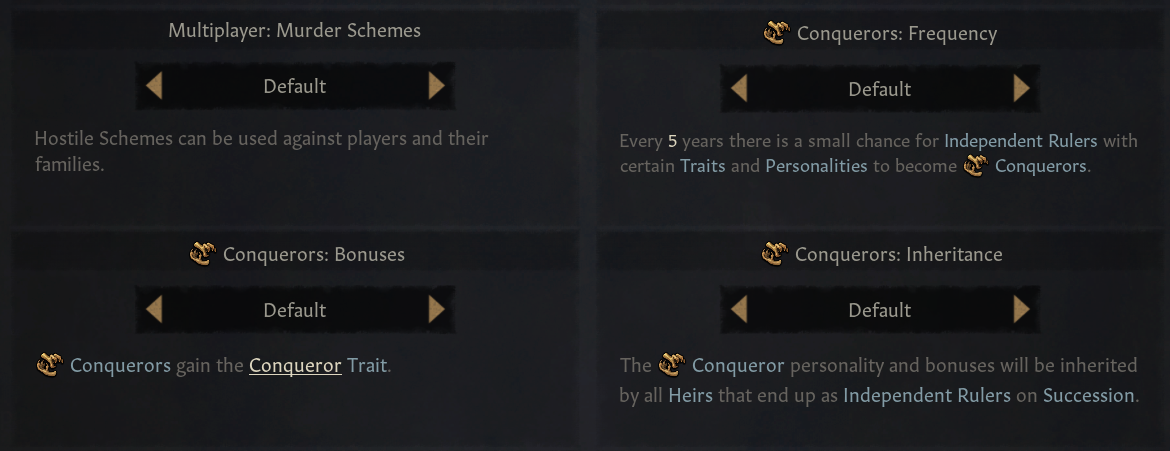
[Image - Game Rules for Conquerors]
Conquerors switch over to a hyper-aggressive version of the AI, which is much faster to declare wars, can declare multiple wars at once, and invests all of their resources into warfare, MaA, and means in which to declare more and better wars (such as hunt activities if they’re low on prestige and you’ve disabled their special bonuses via game rules, or taxation tours if they’re low on gold, etc.). They switch to the objectively best lifestyle focuses, use schemes in a very realpolitik way, etc.
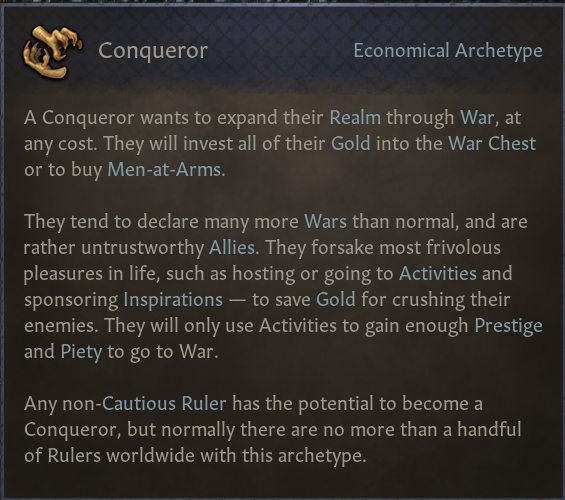
[Image - Conqueror economical Archetype]
By default, they get the ‘Conqueror’ trait which provides a host of powerful boons, making them have an easier time fielding a large army and keeping their realms stable. If you prefer to not give the AI any handicap, you can turn this off in the game rules. I avoided certain types of bonuses, such as making their troops fight better, or them having an artificially high advantage in combat, because such bonuses can feel unfair - instead opting for areas in which the player often has an advantage (economy, realm stability, etc.).
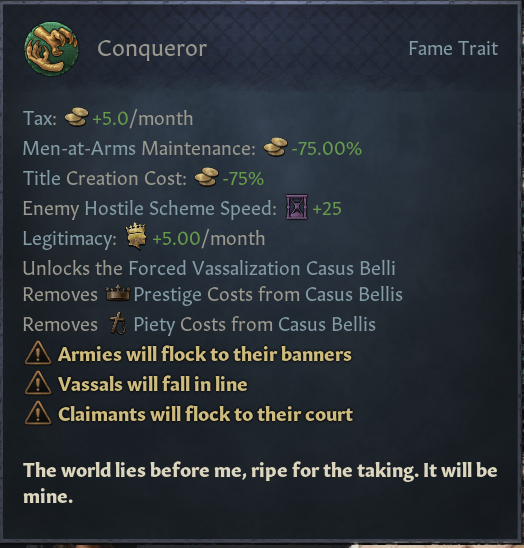
[Image - Conqueror trait bonuses]
Of course, if you fancy a truly unfair challenge you can set the game rule to ‘extreme’, where they’ll get an additional ‘scourge of god’ modifier. This is masochistic and not really recommended!
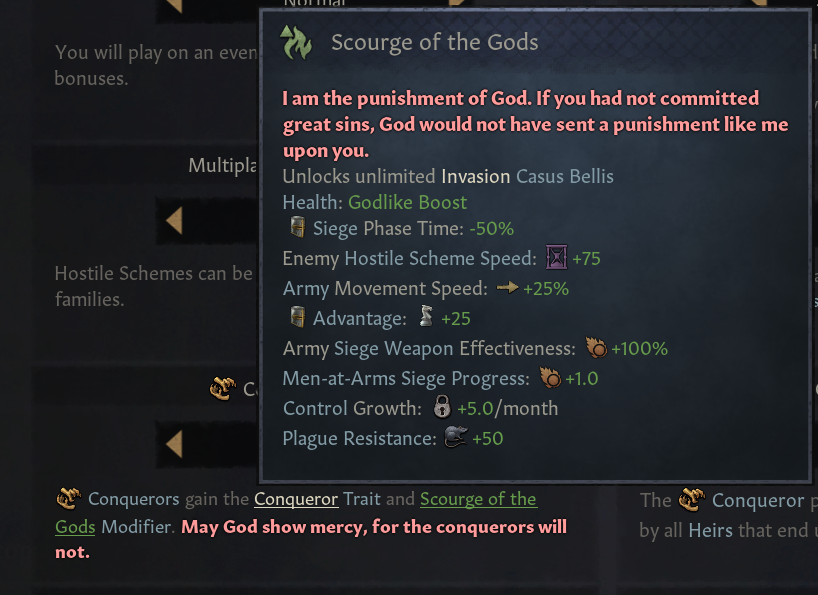
[Image - Scourge of God bonuses]
With default game rules, rulers around the world have a very, very small chance to become Conquerors. The likelihood goes up the more suitable they are based on traits, government, available CB’s, etc. A global pacing mechanic makes sure that there aren’t too many of these characters worldwide, and that they mostly appear in areas where you’d expect large upheavals in the regional power structure (but there are never any guarantees - they could appear anywhere!). You can also control via game rules if you only want already-powerful rulers to have the chance.
Everything good has to come to an end - if they are defeated repeatedly in wars, lose all of their prestige, or similar, they will stop being conquerors and lose all bonuses. On succession, being a conqueror is inherited by default - but if an AI is Cautious (in other words; a craven coward) they will also stop being a conqueror. This creates a dynamic ebb and flow of challenge.
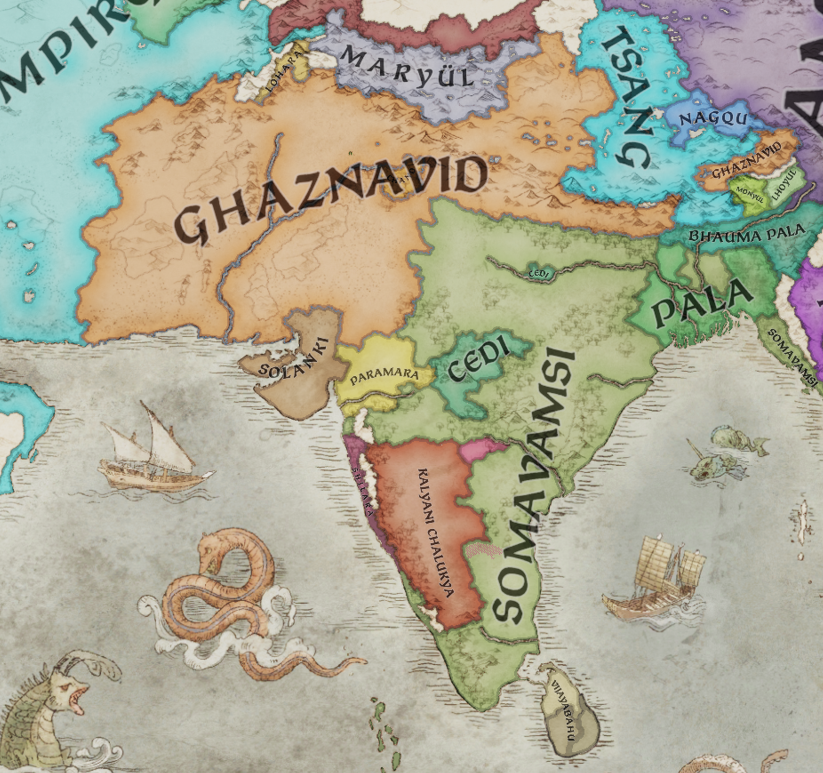
[Image - Two conquerors, the Ghaznavids and the Somavamsi, splitting India between them]
This feature will help the mid-to-late game feel less stale when you’ve forged a grand realm, and will be coming in the update alongside Roads To Power.
Choose a New Destiny Those of you who followed what we did for the Black Forge Jam know about this feature; when you die, you now have the opportunity to switch to one of three carefully-selected dynasty members. These picks are chosen based on an ‘interest score’, where various subjective things are chosen to make a character more or less interesting. Feel free to suggest things that you consider interesting, such as various combinations of traits and/or skills. Having rare traits or being in peculiar situations (such as being the only one in your dynasty of a certain faith) will score a character higher, while being awfully rich will weigh them down (as that isn’t as much fun as just trivializing the challenge.)
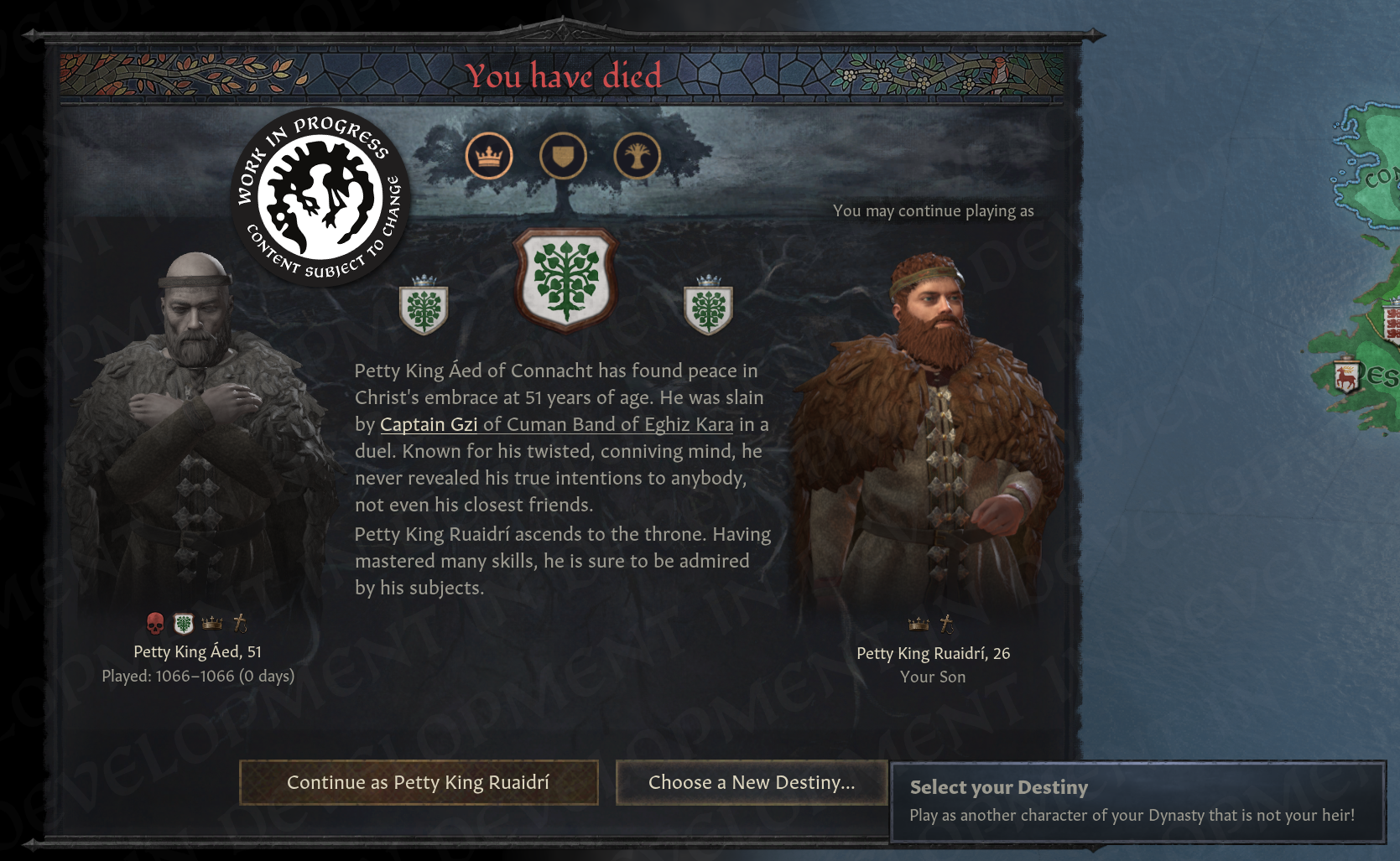
[Image - Updated death screen with the new Choose a New Destiny button]
The point of this feature is to give you opportunities to take on challenges - perhaps you have an awfully interesting one-eyed albino uncle who’s a count of a foreign faith within a distant realm? Now you will have the opportunity to change the course of your game and experience these much rarer situations. Situations that don’t exist when you start the game within the bookmarks. When you feel accomplished and ‘finished’ with what you’re currently doing, you can treat it as a ‘New Game+’ within the same session.
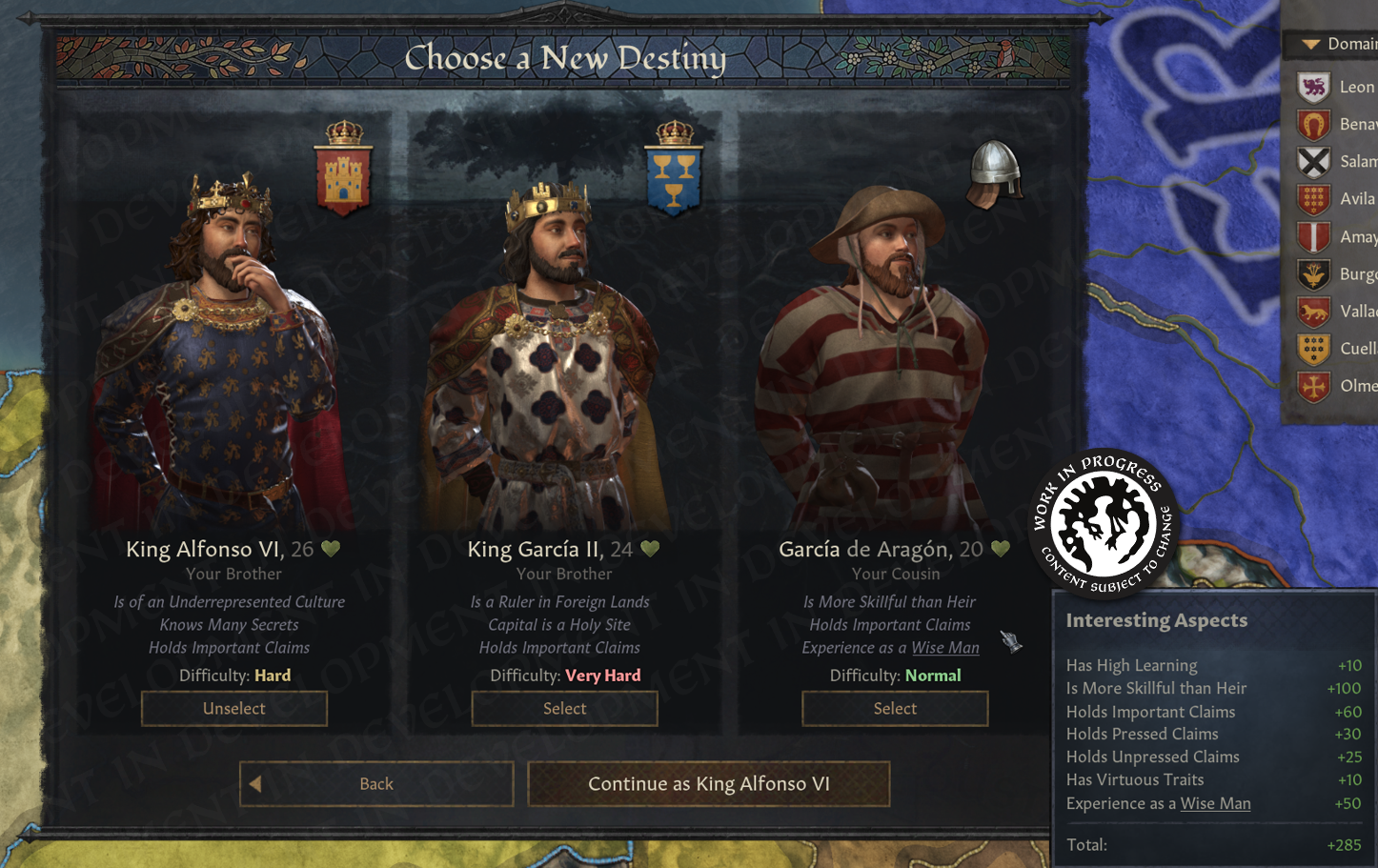
[Image - example characters in a Choose a New Destiny]
Currently there’s no inherent bonus associated with making this switch - and I’m in two minds if there should be any. I’ve been considering adding a small renown boon for choosing to switch, perhaps based on their difficulty. I welcome feedback on this point.
On the Road to Power As I’ve seen a lot of discussions about how Adventurers will play, I thought I would give a brief overview of how we’re designing them. This will not be exhaustive (that will come in later Dev Diaries), but I think it’s interesting to share how we see the experience.
Playing as an average Adventurer will be a zero-to-hero experience, a completely separate experience from how you play a landed character, where you work your way up in the world. You will travel a lot, and accumulate resources to improve your standing. It won’t be easy to gain land depending on the goals you set for yourself - gaining a small plot of land will naturally not be as difficult as doing something epic like invading a kingdom (except if you’re an Adventurer with the special Legitimists purpose, in which case it’s intended that you can amass a big army and lots of support quickly! This will be rare though). It will also definitely be possible to play as a multi-generational adventurer, should you want.
Before ending this Dev Diary, I’d like to leave you with some screenshots of upcoming features of Roads to Power and its accompanying update. Firstly, we’ve already hinted at this, but the free update coming alongside the expansion will introduce a new 1178 start date, alongside two bookmarks - one focusing on the Byzantine Empire and its surroundings, the Call of the Empire. 1178 provides a more built-up starting situation than the 867 or 1066 starts do, and also gives you access to a whole host of new historical characters and dynasties to play, such as Saladin of Egypt or the Plantagenets in England - not to mention that the centerpiece realm of Roads to Power, Byzantium, is in a challenging situation with the Sultanate of Rum on its doorstep.
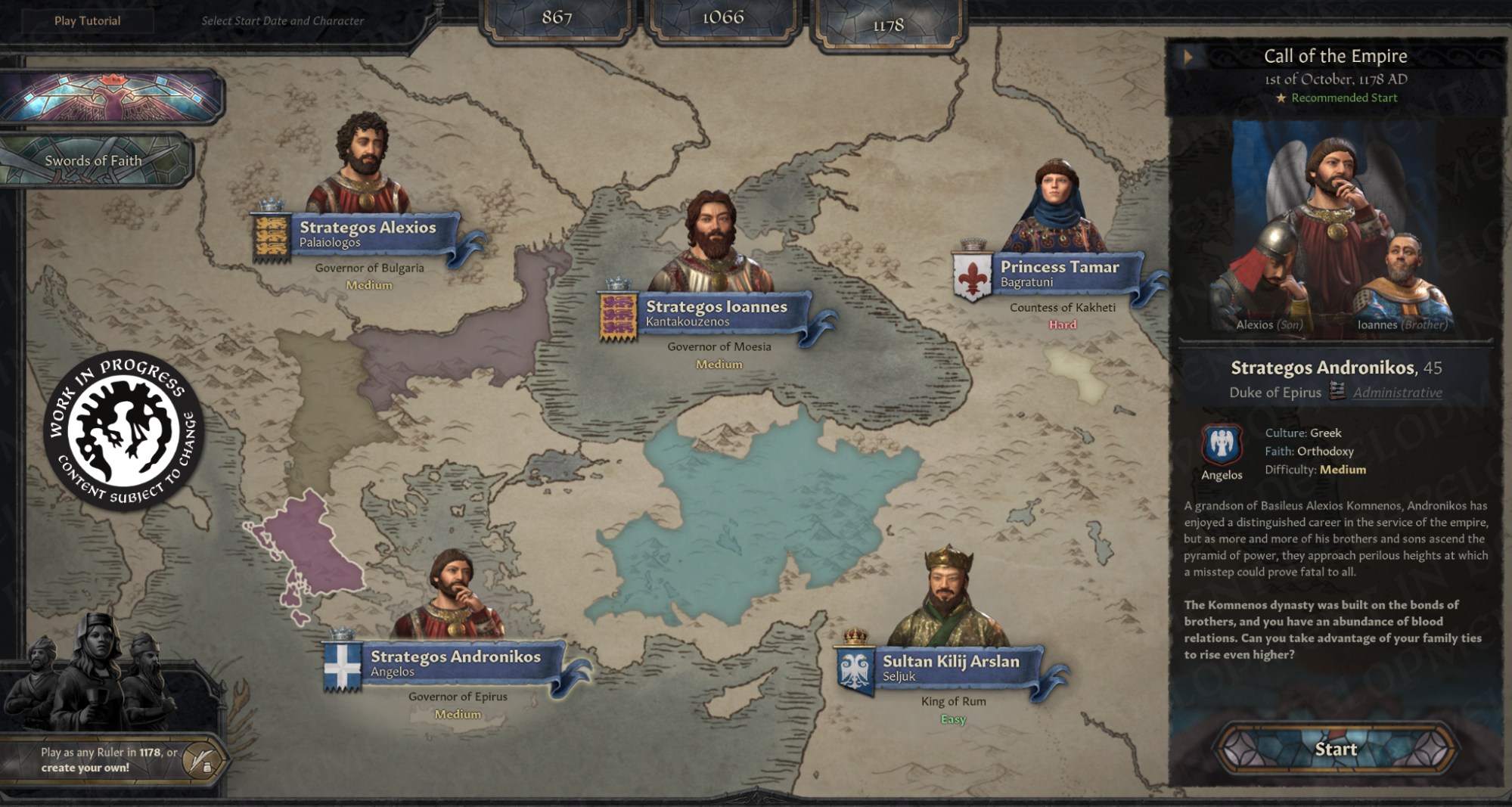
[Image - Call of the Empire bookmark in 1178]
Secondly, I’d like to show off a screenshot of the ‘Estate’ feature that Noble families inside of Byzantium (or other administrative empires) will have access to. As you can see, the estate has a location on the map from where it can be accessed (in this case Athens) and a whole host of building upgrade options - ranging from the mansion itself, external buildings (the Watchtower, Storehouse, and Hay Barracks in the picture), and internal upgrades (like the Granaries shown to the right), there’s even branching upgrades where you have to choose what you want the most. The Estate is managed by the House Head, and there’s one per family.
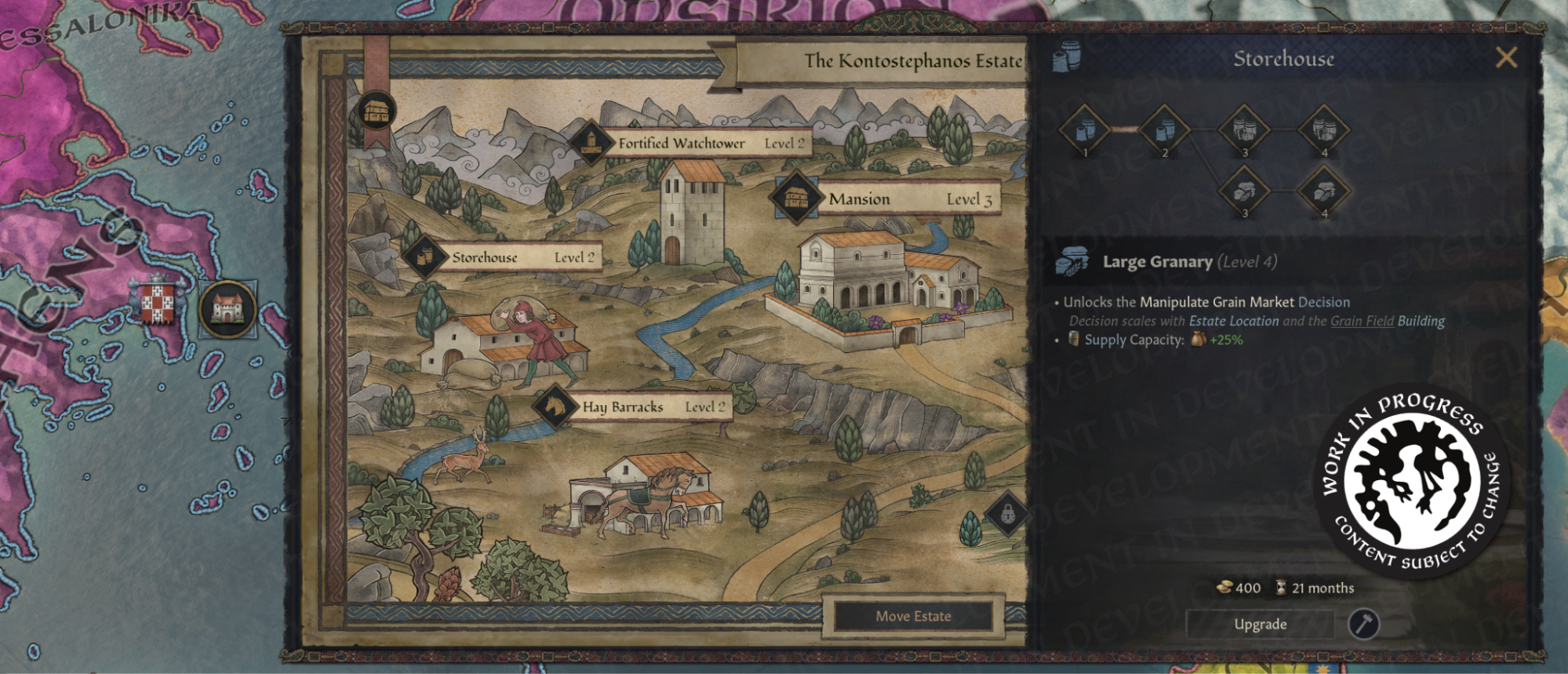
[Image - An estate in 1178, map location visible, with an ‘external building slot’ upgrade tree shown]
As I mentioned earlier in this diary, we’re committing to having more detailed Dev Diaries for Roads to Power. While there are some more teaser-like sections in this Dev Diary, that will not be the norm going forward - there should be no room for misinterpreting what we’re making, or how it will work!
1.12.5 Update Changelog (Community Manager note: Including the changelog would push us over the character limit for a Steam announcement!
Check our forum thread for the list of changes.[pdxint.at])
Join the conversation and connect with other Paradox fans on our social media channels!
Official Forums[forum.paradoxplaza.com] Official Discord[discord.gg] Steam Discussions[steamcommunity.com]
Twitter[twitter.com] Facebook[www.facebook.com] Instagram[www.instagram.com] Youtube[www.youtube.com]













